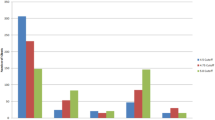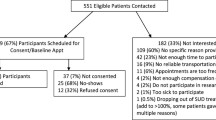Abstract
Pay for performance, the provision of financial incentives for favorable performance, is increasingly under study as an evidence-based practice. This study estimated the improvement in client retention from offering incentives to 11 substance abuse counselors providing outpatient aftercare treatment. During the incentive period, a counselor could earn a bonus of $100, in addition to his regular compensation, for each client who completed at least five aftercare sessions (the “milestone” which we considered the minimum adequate dose of the aftercare curriculum). We evaluated this and a similar, 12-session incentive using a logistic regression in which the retention “milestone” was the dependent variable and the proportion of time in the incentive condition was the independent variable. Among the 123 clients offered this aftercare program, their probability of completing at least 5 sessions was 59% with the incentive compared to 33% beforehand (odds ratio 4.1, P<.01). These findings suggest that counselor incentives are an effective strategy to improve client retention in substance abuse treatment.

Similar content being viewed by others
References
Bachman, J. (2004). Pay for performance in the behavioral healthcare arena. In Depression in primary care journal watch. Pittsburgh, PA: Department of Psychiatry, University of Pittsburgh School of Medicine. At http://www.wpic.pitt.edu/dppc/journalwatch_2004_11.htm, updated December 19, 2004, accessed March 4, 2006.
Beinecke, R. H., Shepard, D. S., & Hurley, C. L. (2006). Guest Editors’ Introduction Implementing evidence-based mental health practices and performance measures in Massachusetts. Administration and Policy in Mental Health(submitted).
Beutler, L. E., Zetzer, H., & Yost, E. (1997). Tailoring interventions to clients: Effects on engagement and retention. In L. S. Onken, J. D. Blaine, & J. J. Boren (Eds.), Beyond the therapeutic alliance: Keeping the drug-dependent individual in treatment. NIDA Research Monograph 165.
Carroll, K. M. (1997). Enhancing retention in clinical trials of psychosocial treatments: Practical strategies. In L. S. Onken, J. D. Blaine, & J. J. Boren (Eds.), Beyond the therapeutic alliance: Keeping the drug-dependent individual in treatment. NIDA Research Monograph 165.
Commons, M., McGuire, T. G., & Riordan, M. H. (1997). Performance contracting for substance abuse treatment. Health Services Research, 32(5), 631–650.
DiClemente, C. C., & Scott, C. W. (1997). Stages of change: Interactions with treatment compliance and involvement. In L. S. Onken, J. D. Blaine, & J. J. Boren (Eds.), Beyond the therapeutic alliance: Keeping the drug-dependent individual in treatment. NIDA Research Monograph 165.
Dudley, R., Frolic, A., Robinowitz, D., Talavera, J. A., Broadhead, P., & Luft, H. S. (2004). Strategies to support quality-based purchasing: A review of the evidence. Summary, Technical Review Number 10. (Prepared by Stanford University of California, San Francisco. Evidence-based Practice Center under Contract No. 290-02-00017) AHRQ Pub. No. 04-P024. Rockville, MD: Agency for Healthcare Research and Quality, 2004, from http://www.ahrq.gov/clinic/epcsums/qpurchsum.htm
Dudley, R. A., Miller, R. H., Korenbrot, T. Y., & Luft, H. S. (1998). The impact of financial incentives on quality of health care. The Milbank Quarterly, 76(4), 649–686.
Grumbach, K., Osmond, D., Vranizam, K., Jaffe, D., & Bindman, A. B. (1998). Primary care physicians’ experience of financial incentives in managed care systems. The New England Journal of Medicine, 339(21), 1516–1521.
Hanchak, N.A., Schlackman, N., & Harmon-Weiss, S. (1996). U.S. Healthcare’s quality-based compensation model. Health Care Financing Review, 17(3), 143–159.
Higgins, S. T., & Budney, A. J. (1997). From the initial clinic contact to aftercare: A brief review of effective strategies for retaining cocaine abusers in treatment. In L. S. Onken, J. D. Blaine, & J. J. Boren (Eds.), Beyond the therapeutic alliance: Keeping the drug-dependent individual in treatment. NIDA Research Monograph 165.
Higgins, S. T., Wong, C. J., Badger, G. J., Ogden, D. E., & Dantona, R. L. (2000). Contingent reinforcement increases cocaine abstinence during outpatient treatment and 1 year of follow-up. Journal of Consulting and Clinical Psychology, 68(1), 64–72.
Hubbard, R. L., Craddock, S. G., & Anderson, J. (2003). Overview of 5-year follow-up outcomes in the drug abuse treatment outcome studies (DATOS). Journal of Substance Abuse Treatment, 25(3), 125–134.
Hubbard, R. L., Marsden, M. E., Rachal, J. V., Harwood, H. J., Cavanaugh, E. R., & Ginzburg, H. M. (1989). Drug abuse treatment: A national study of effectiveness. Chapel Hill: The University of North Carolina Press.
Jamtvedt, G., Young, J. M., Kristoffersen, D. T., Thomson O’Brien, M. A., & Oxman, A. D. (2005). Audit and feedback: Effects on professional practice and health care outcomes. Cochrane Database Systematic Review, (3), CD000259.
Kamb, M. L., Rhodes, F., Hoxworth, T., Rogers, J., Lentz, A., Kent, C., MacGowen, R., & Peterman, T. A. (1998). What about money: Effect of small monetary incentives on enrollment, retention, and motivation to change behaviour in an HIV/STD prevention counseling intervention. Sexually Transmitted Infections, 74(4), 253–255.
Kamis-Gould, E. (1987). The New Jersey performance management system: A state system and uses of simple measures. Evaluation and Program Planning, 10, 249–255.
Lane, N. E. (2005). Performance incentives in the Massachusetts behavioral health program. Administration and Policy in Mental Health, 32, 387–401.
Liese, B. S., & Beck, A. T. (1997). Back to basics: Fundamental cognitive therapy skills for keeping drug-dependent individuals in treatment. In L. S. Onken, J. D. Blaine, & J. J. Boren (Eds.), Beyond the therapeutic alliance: Keeping the drug-dependent individual in treatment. NIDA Research Monograph 165.
Luborsky, L., Barber, J. P., Siqueland, L., McLellan, A. T., & Woody, G. (1997). Establishing a therapeutic alliance with substance abusers. In L. S. Onken, J. D. Blaine, & J. J. Boren (Eds.), Beyond the therapeutic alliance: Keeping the drug-dependent individual in treatment. NIDA Research Monograph 165.
Luborsky, L., McLellan, A. T., Woody, G. E., O’Brien, C. P., & Auerbach, A. (1985). Therapist success and its determinants. Archives of General Psychiatry, 42, 602–611.
McCusker, J., Bigelow, C., Vickerlahti, M., Spotts, D., Garfield, F., & Frost, R. (1997). Planned duration of residential drug abuse treatment: Efficacy versus effectiveness. Addiction, 92(11), 1467–1478.
Newman, C. F. (1997). Establishing and maintaining a therapeutic alliance with substance abuse patients: A cognitive therapy approach. In L. S. Onken, J. D. Blaine, & J. J. Boren (Eds.), Beyond the therapeutic alliance: Keeping the drug-dependent individual in treatment. NIDA Research Monograph 165.
Onken, L. S., Blaine, J. D., & Boren, J. J. (1997). Treatment for drug addiction: It won’t work if they don’t receive it. In L. S. Onken, J. D. Blaine, & J. J. Boren (Eds.), Beyond the therapeutic alliance: Keeping the drug-dependent individual in treatment. NIDA Research Monograph 165.
Piotrowski, N. A., Tusel, D. J., Sees, K. L., Reilly, P. M., Banys, P., Meek, P., & Hall, S. M. (1999). Contingency contracting with monetary reinforcers for abstinence from multiple drugs in a methadone program. Experimental and Clinical Psychopharmacology, 7(4), 399–411.
Ritter, G., Reif, S., Gadzuk, A., Krenzke, T., Mohadjer, L., Lee, M. T., & Horgan, C. M. (2005). Incentive effects on cooperation rates and sample composition in the alcohol and drug services study. Journal of Economic and Social Measurement, 30(2–3), 171–189.
Rosenthal, M. B., Fernandopulle, H. R. S., & Landon, B. (2004). Paying for quality: Providers’ incentives for quality improvement. Health Affairs (Project Hope), 23(2), 127–141.
Rothfleisch, J., Elk, R., Rhoades, H., & Schmitz, J. (1999). Use of monetary reinforcers by cocaine-dependent outpatients. Journal of Substance Abuse Treatment, 17(3), 229–236.
Shepard, D.S., Beaston-Blaakman, A., & Horgan, C. (2003). The ADSS cost study: Costs of substance abuse treatment in the specialty sector. Rockville, MD: Substance Abuse and Mental Health Services Administration, Office of Applied Studies, DHHS Publication No. SMA 03-3762, Analytic Series: A-20. Web: http://www.samhsa.gov/oas/adss/ADSSCostStudy.pdf
Shepard, D. S., McKay, J., Love, C., Strickler, G., Bury-Maynard, D. P., Ritter, G., Constantine, R., Jacobson, G., & Calabro, J. (2001). Cost-effectiveness of aftercare in drug abuse treatment. Presented at the 129th Annual Meeting of the American Public Health Association, Atlanta, GA, Oct. 21–25, 2001, Session 5003.0, Abstract #24848. Web: http://www.apha.confex.com/apha/129am/techprogram/paper_24848.htm.
Stark, M. J. (1992). Dropping out of substance abuse treatment: A clinically oriented review. Clinical Psychological Review, 12, 93–116.
Stark, M. J., Campbell, B. K., & Brinkerhoff, C. V. (1990). “Hello, may we help you?” A study of attrition prevention at the time of the first phone contact with substance abusing clients. American Journal of Drug and Alcohol Abuse, 16, 67–76.
Acknowledgments
The authors gratefully acknowledge ongoing support from the Bureau of Substance Abuse Services of the Massachusetts Department of Public Health, support of the Brandeis/Harvard NIDA Center (P50 DA010233), and assistance from NIDA grant R01 DA08739.
Author information
Authors and Affiliations
Corresponding author
Additional information
The authors acknowledge ongoing support of the Massachusetts Department of Public Health Bureau of Substance Abuse Services financial assistance from grant R01 DA08739 from the National Institute on Drug Abuse.
Rights and permissions
About this article
Cite this article
Shepard, D.S., Calabro, J.A.B., Love, C.T. et al. Counselor Incentives to Improve Client Retention in an Outpatient Substance Abuse Aftercare Program. Adm Policy Ment Health 33, 629–635 (2006). https://doi.org/10.1007/s10488-006-0054-2
Published:
Issue Date:
DOI: https://doi.org/10.1007/s10488-006-0054-2




